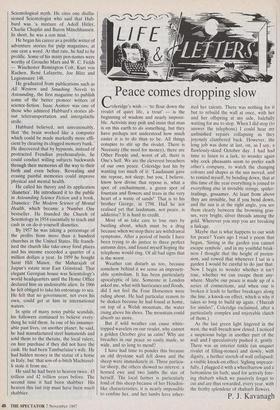Peace comes dropping slow
Coleridge's wish — `to float down the rivulet of quiet life, a trout' — is the beginning of wisdom and nearly impossi- ble. Activists may pish and insist that man is on this earth to do something, but they have perhaps not understood how much easier it is to do than to be. All things conspire to stir up the rivulet. There is Necessity (the need for money), there are Other People and, worst of all, there is One's Self. We are the cleverest breachers of our own peace. Coleridge lost his by wanting too much of it: 'Laudanum gave me repose, not sleep; but you, I believe, know how divine that repose is, what a spot of enchantment, a green spot of fountain and flowers and trees in the very heart of a waste of sands!' That is to his brother George, in 1798. Had he not realised yet that laudanum, not peace, is addictive? It is hard to credit.
Most of us take care to lose ours by bustling about, which must be a drug because when we stop. there are withdrawal symptoms. After a period of bustle I have been trying to do justice to three perfect autumn days, and found myself hoping the telephone would ring. Of all bad signs that is the worst.
Weather can disturb us too, because somehow behind it we sense an impenetr- able symbolism. It has been particularly apocalyptic of late. Someone in London asked me, what with hurricanes and floods, did I not feel the Four Horsemen were riding about. He had particular reason to be shaken because he had found at home, on top of a Welsh mountain, the water rising above his shoes. The mountain could absorb no more.
But if wild weather can cause white- topped wavelets on our rivulet, why cannot a golden October give us calm? Why are breaches in our peace so easily made, so wide, and so long to mend?
I have had time to ponder this because an old drystone wall fell down and the sheep were immediately in. Three particu- lar sheep, the others showed no interest: a horned ewe and two lambs the size of herself. The local farmer is particularly fond of this sheep because of her Houdini- like characteristics; it is nearly impossible to confine her, and her lambs have inher- ited her talents. There was nothing for it but to rebuild the wall at once, with her and her offspring at my side, balefully waiting for me to stop. When I did stop (to answer the telephone) I could hear my unfinished repairs collapsing as they joyously clambered back. However, the long job was done at last, on, as I say, a flawlessly-skied October day. I had had time to listen to a lark, to wonder again why cock pheasants seem to prefer each other's company, to watch the changing colours and shapes as the sun moved, and to remind myself, by bending down, that at this time of the year everything is joined to everything else in invisible strings, spider- trailings, gossamer. At least from above they are invisible, but if you bend down, and the sun is at the right angle, you see them clearly between the browning gras- ses, very bright; silver threads among the gold. Wherever you step you are breaking a linkage.
Maybe that is what happens to our wish for peace? Years ago I read a poem that began, 'Sitting in the garden you cannot escape symbols', and in my youthful brisk- ness I thought that the height of preten- sion, and vowed that whenever I sat in a garden I would be careful to do just that. Now I begin to wonder whether it isn't true, whether we can escape them any- where. Maybe our peace is made up of a series of connections, and when one is broken it leads to further breakages along the line, a knock-on effect, which is why it takes so long to build up again. ('Hurrah for similes!', Coleridge exclaimed, after a particularly complex and enjoyable clutch of them.) As the last green light lingered in the west, the wall-breach now closed, I noticed a suspicious bulge in another part of the wall and I speculatively pushed it, gently. There was an interior tinkle (an unquiet rivulet of filling-stones) and slowly, with dignity, a further stretch of wall collapsed; a visible knock-on effect. Sighing unpeace- fully, I plugged it with a wheelbarrow and a bottomless tin bath, used for actively forc- ing rhubarb which we passively forget to cut and are thus rewarded, every year, with the frothy splendour of rhubarb flowers.
P. J. Kavanagh


































































 Previous page
Previous page